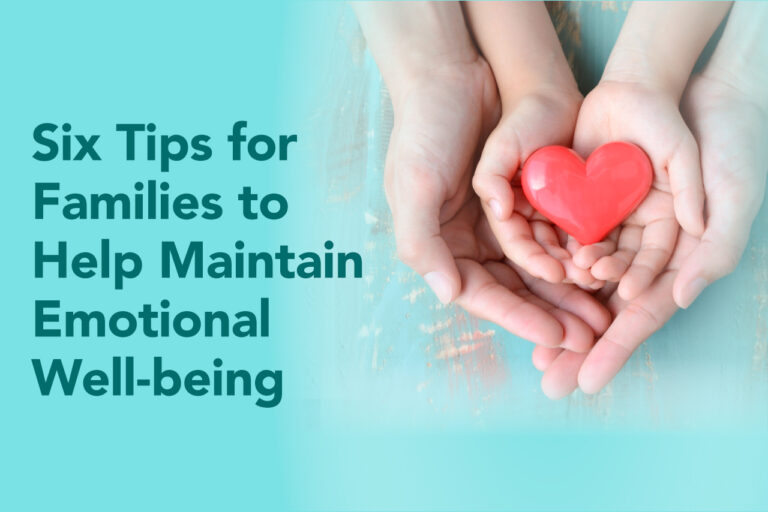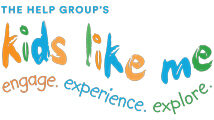
As we have all been dealing with an unprecedented global pandemic; after nearly a year of stay-at-home orders, prolonged social distancing and challenges for some in virtual learning, many parents and their children’s mental health hangs in the balance. With the vaccination rollout, families may have a renewed sense of hope, but the longing for our return to normal life continues. Here are some tips to help maintain emotional well-being:
Give Your Kid’s Day Structure and Safety
• Be consistent
• Stick to a schedule – All children need routines and a structured environment. Children with ASD can struggle when life is unpredictable.
• Reward expected behavior – make a sticker chart, also known as a token economy, to help reinforce positive behavior. Grab some low-cost items at the Dollar store that your child can earn when they are doing well. Catch them “being good” like when they actively participate in distance learning, complete household chores, are kind to their siblings, etc. And reinforcements don’t always have to be a tangible. Many children would love to earn extra cuddle time, special story time or an extra 5 minutes of computer time.
• Keep your social “bubble” or “pod” small and accountable. Only form a pod with like-minded family or friends.
Look For Nonverbal Ways to Connect
• Read your child’s body language. They may want to be near you more or seek out increased attention. Give them some extra time and attention when you can, or schedule it in at a more convenient time.
• Monitor your child’s internet activity; many children are not reliable reporters of cyberbullying. Children and adolescents who have experienced cyberbullying are at a much greater risk for self-harm and suicidal ideation. Research has shown that children with ASD are easy targets for cyberbullies, due to their social communication challenges and difficulties with identifying hidden nonverbal signs of bullying.
• Children may also feel more inclined to share important emotional information like feelings of depression, anxiety or frustration through social media channels, text & email or chat rooms (particularly in the gaming realm). To help get your child to open up, you can play a video game with them, do a jigsaw puzzle, watch TicTok, listen to music- anything you think will help your child feel safe to explore their feelings. Finally, you can send them an email or text letting them know how much they mean to you or how proud you are of them. It’s the little things!
Practice Parent Self-Care
• Allow yourself some strong social connections/outlets with family and friends. This can set a good example for your kids on how to stay socially connected. Try to set up a game night on Zoom, Mom’s Wine Club, virtual family dinners, etc. Your kids will see this as a healthy way to combat isolation.
• Set up a routine that involves Mindfulness & Mediation. Since the pandemic started many of the fee-for-use meditation apps are offering a free subscription. Now is the perfect time to take advantage of that!
• Get enough sleep; It may sound silly, but sleep is vital to maintain your functioning throughout this challenging time. Sleep routines may be off during COVID; many of us are going to bed later and sleeping in a bit as we no longer have to commute. And that’s OK as long as you try to have the same routine most nights. Naps may become your best friend and again, that’s OK.
Find Resources and Help For the Whole Family
• Parent Support Groups are highly recommended. There are free parent support groups available currently. They are mostly conducted on zoom and serve to connect parents, caregivers, etc. to those dealing with similar issues. Support Groups can help normalize all the stress we have been under for nearly a year. Kids Like Me offers a free bi-weekly Parent Support Group for families with school aged children. Visit our website for more information.
• Find a therapist that suits your needs, whether for you, your child or the entire family. Speaking to a therapist weekly can improve so many aspects of your life. Many insurance companies are waving the copay currently for telehealth therapy. The Help Group is currently providing individual, family and parent counseling. Please contact us for more information.
Keep Your Children Busy
• Get outside, we all need more opportunities to breathe some fresh air, even with a mask on!
• Move your body! Go for a bike ride, walk, scoot, hike or do some family yoga!
• Find some resources to keep your kids engaged. The internet is full of free art workshops, fun yoga videos for kids, programs to help you learn a new language, guided meditations geared towards your child’s interests, and so much more!
Don’t Give Up! You’ve Got This!
• With kids and families forced to stay at home, the challenge of distance learning for children with special needs, and your own switch to working from home has likely been stressful. But no matter what happens, or doesn’t get done, don’t beat yourself up! Being a parent in “regular times” is hard enough, so allow yourself time to breathe and reconnect during the pandemic! And know that despite what it may look like on social media, most of us are struggling with the same things you are.
• Attend a free parenting webinar or workshop. View The Help Group's webinars here.
• Call a friend to cry, vent, scream, etc. Whatever works for you, do it! It’s only weird if you make it weird!
Hotlines
If you are feeling overwhelmed or need someone to talk to about a family situation, please reach out to connect with one of the resources below or the mental health crisis numbers.
- National Parent Helpline 1-855-427-2736 Operated by Parents Anonymous.
- National Parent Helpline 1-800-799-SAFE (7233) or TTY 1- 800-787-3224 Email and live chat are also available.
- Postpartum Support International Helpline 1-800-944-4773.
- Mother-Baby Hope Line- Redleaf Center for Family Healing Provides Free mental health phone support for pregnant and postpartum parents and families with children 0-5 years old, as well as the mental health and medical providers that serve them. Our staff will listen and guide you to the right support — either at the Mother-Baby Program or in your community. This is not a crisis line. Call 612-873-4673. The HopeLine is available Monday through Friday, 8:30 am – 4:30 pm.
- Autism Society National Helpline 800-328-8476
- LGBTQIA Hotline: The Trevor Project 1-866-488-7386

Nicole Webb, LMFT
Kids Like Me Program Director
Nicole Web is Kids Like Me Program Director and is a registered Marriage and Family Therapist (MFT). She has worked with children extensively over the past fifteen years as a therapist, behaviorist, and camp director. Nicole received a Master of Science degree in Marriage and Family Therapy from the University of Southern California and a Bachelor of Arts degree in Child and Adolescent Development and Psychology from California State University, Northridge.
In 2010, Nicole began her work at The Help Group as the Program Director for Kids Like Me, working closely with children and teens with autism spectrum disorder and other special needs. Nicole’s dedication to promoting autism awareness throughout the community has prompted her to give a number of presentations at local universities and organizations. She has also spoken internationally on topics related to autism and treatment modalities.
